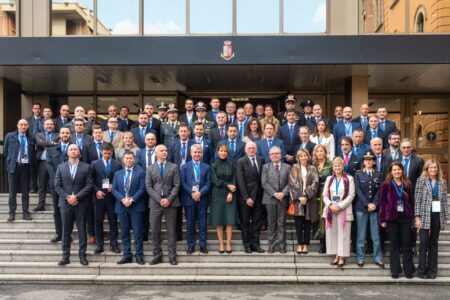“Security cooperation in the Western Balkans – challenges and lessons from the pandemic to the war in Ukraine”
More than 70 speakers from 40 countries and over one hundred sector experts took part in the 17th Annual Regional (Jumbo) Security Coordination Conference in Rome, on 18 and 7 November, at the Higher Police School bilateral collaboration with the countries of the Western Balkans.
The conference, co-organized by the International Relations Service of the Police Force Coordination and Planning Office of the Ministry of the Interior together with the Regional Cooperation Council and the Ministry of Foreign Affairs and International Cooperation, saw the participation of numerous National Authorities and the Balkan countries as well as representatives of major international organizations.
The conference developed around the hot topics of the security sector that most interested and still continue to interest the Balkan Region and the EU, with a focus on the activities carried out by all the actors involved in the event and which exercise, in various capacities, in that area and on possible interactions.
The opening session, inaugurated by the Deputy Director General of Public Security in charge of Coordination and Planning, Prefect Stefano GAMBACURTA, together with the Secretary General of the Regional Cooperation Council, Majlinda BREGU and the Director General for Europe and international trade policy , Min. Plen. Vincenzo CELESTE, constituted a fundamental moment of choral reflection. An opportunity to testify, once again, the will of Italy and the countries of the Western Balkans to want to be a mutual point of reference for the definition of security processes that look at the pursuit of stability and legality with the Balkan countries, through a unified and structured vision of the reference tools and models to be used to achieve common objectives.
Hence the need to formulate collective responses to current security threats also and above all through the launch of strategic partnerships with the EU and to find new response strategies to current challenges by drawing attention to the interconnection of three fundamental elements: security, stability and prosperity.
However, the real core business of the event was the animated participation of moderators and almost 70 Italian and foreign speakers who, in sharing their respective know-how, were the real protagonists of the symposium.
The agenda, divided into five technical Panels, all chaired by the Director of the International Relations Service, Senior Executive of the State Police, Eufemia ESPOSITO and by the Director of the Political Office of the Regional Cooperation Council, Ambassador Amer KAPETANOVIC, together with the moderators, experts sector, covered critical events management, radicalisation, violent extremism and terrorism, as well as transnational organized crime, irregular immigration and cybercrime.
More specifically, in dealing with the delicate issue of the energy crisis as a direct derivative of the Russo-Ukrainian war, the appropriate definition of common, effective and efficient strategies was agreed, aimed at stemming the vacuum created by these extraordinary events into which organized crime making its greatest profits. Three new conceptual strategies have also been outlined in the security approach: “green”, in the sense that we need to be more sensitive to climate change and its impact on security; "smart" by putting in place actions aimed at guaranteeing solid energy security and stability of countries, ultimately, "innovative".
The session dedicated to radicalisation, violent extremism and terrorism recorded many points of convergence, above all with reference to the activities of preventing and contrasting radicalisation. The speakers agreed in noting how the current terrorist threats have been exacerbated by the Russian-Ukrainian conflict and by the pandemic which have contributed, each in their own way, to accelerating the need to adopt suitable measures to protect our security systems, through the development of integrated programs between the various institutions and in collaboration with the various states.
In this panorama, also on the side of transnational organized crime, fluctuating dynamics have been highlighted in the major sectors of interest such as the trafficking of drugs, weapons and human beings. Among the main challenges, the following have been identified: the growing use of migratory routes for illicit trafficking; the emergence of the so-called Southern route in drug trafficking from Africa to the Balkan countries and, lastly, the new worrying market for methamphetamines and, in particular, for the illegal use of its precursor, ephedrine.
With regard to cooperation, challenges and objectives in the fight against illegal immigration in the countries of the Western Balkans, the significant increase in irregular migratory flows through the Balkan route recorded this year was underlined. The umpteenth consequence of the war in Ukraine which continues to put a strain on the reception and border management and immigration systems of the Western Balkans. Converging positions on the need for an increasingly close collaboration between countries of origin, transit and destination of flows, with a view to a shared and responsible approach to the common challenges that the Member States of the European Union and the partners of the Western Balkans face called to face.
Even the cyber threat imposes the necessary adoption of strategies aimed at countering increasingly technologically advanced and transnational attacks. In this sense, all the experts in the sector have recognized the need to activate public/private synergies and collaborations. A collaboration, therefore, which starts from police cooperation but which also winks at cooperation with the private sector and with the academic and research world in terms of capacity building, early-warning and info-sharing. In this wake, given that the European Union must also play its part by maintaining a positive and proactive approach towards the countries of the Western Balkans, the regional experts emphasized the urgent need to proceed with the harmonization of national regulatory frameworks , the sharing of experiences and good practices, staff training, the creation of interconnected databases that can speed up information-investigative exchanges and encourage the performance of joint operational activities.
